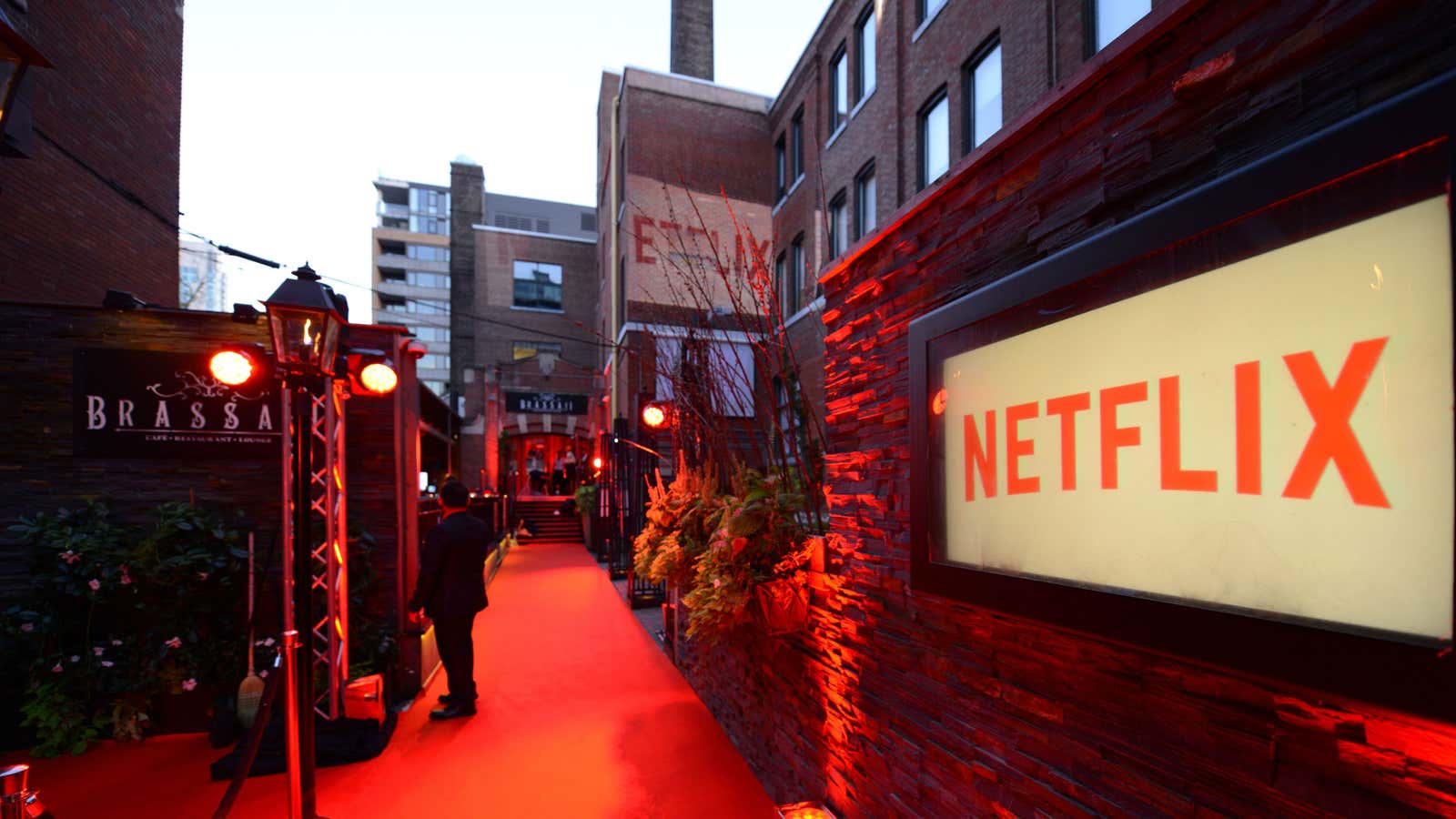At the TV advertising upfronts last May, as the US broadcast networks unveiled their fall lineups for advertisers, one of NBC’s most exciting new offerings was a comedy it had slated for midseason, Unbreakable Kimmy Schmidt. Co-created by Tina Fey, it was about a woman (played by The Office’s Ellie Kemper) who escapes a doomsday cult and restarts her life in New York City.
But when Unbreakable Kimmy Schmidt finally debuts in March, it will be airing not on NBC but on Netflix, which announced late Friday that it had acquired the series from NBC, and given it a two-season commitment. This is the fifth big series pickup that Netflix has made in the past two weeks, and comes just two days after it announced a fourth season of Longmire, the high-rated (but older-skewing) drama that A&E had canceled in August.
Gone are the days where Netflix tried to make a splash with programming you couldn’t find anywhere else on TV, most notably Orange is the New Black. While cable networks like USA and AMC are trying to save themselves by retrenching and focusing on what they do best, Netflix is taking the opposite approach: it wants to be everything to everyone.
That’s a formidable objective, given that not even the broadcast networks—which have always catered to a mass audience—seem to be able pull that off any longer. They’ve all struggled to launch new comedies, which are the backbone of any successful broadcast network, this fall: four have already been canceled, most of the others have middling ratings and only one—ABC’s sharp, witty Black-ish—is a breakout hit. But most sitcoms need at least a season to discover and hone their comedic tone; this days, new sitcoms get only a handful of episodes to prove themselves before getting yanked if ratings aren’t up to snuff. (Never mind that Cheers and Seinfeld started in the Nielsen basement before blossoming into some of the biggest TV hits of all time.)
In contrast, Netflix can give Unbreakable Kimmy Schmidt the opportunity to grow and find a large audience that already-canceled fall sitcoms like Selfie and A to Z never had. When announcing the pickup, Netflix’s vice president of original content Cindy Holland noted that, “The very construct of Unbreakable Kimmy Schmidt—its offbeat premise, hilarious and rich characters and serialized storytelling—make it a perfect Netflix comedy series.” But the opposite is truth as well” the very construct of Netflix makes it the perfect outlet to nurture sitcoms.
Netflix’s Longmire pickup is also notable, as A&E canceled the drama despite that fact that it averaged 5.6 million viewers, the networks second biggest hit (after Duck Dynasty) and outdrawing other media darlings like Mad Men. But its fans were too old—the median age of its viewers was 60, compared to 48 for the network overall—and far outside the 18-49 and 25-54 demographics that advertisers pay for. Netflix isn’t beholden to advertisers, which means it now has both a popular series and a new demographic of potential subscribers that are being ignored by other networks.
Beyond those recent deals (which also include a series about Queen Elizabeth II and a show based on the popular Lemony Snicket book franchise), Netflix has a pipeline of ambitious shows that dwarf anything the broadcast networks have on tap. Among the tantalizing offerings: Marco Polo (debuting Dec. 19), based on the explorer’s 13th century China exploits in Kublai Khan’s court; Bloodline, a Kyle Chandler drama debuting in March from the creators of Damages; Sense8, a sci-fi drama from Matrix creators Andy and Lana Wachowski; Grace and Frankie, a comedy reuniting 9 to 5 stars Jane Fonda and Lily Tomlin; Love, a relationship comedy series from comedy titan Judd Apatow; and most anticipated of all, multiple Marvel series focusing on comic-book characters like Luke Cage, Jessica Jones and Iron Fist, kicking off next May with Marvel’s Daredevil.
There’s even more: animated spinoffs from franchises like Madagascar, Shrek and Care Bears, a Chelsea Handler-hosted talk show in 2016, and, oh yeah, new seasons of hits House of Cards, Orange is the New Black and its animated series for adults, BoJack Horseman. It’s a slate that any network would love to have, with something for audiences of every age.
But it’s also huge departure from the kind of original series Netflix gravitated towards when it was first making a name for itself by wooed audiences with content that no one else had: a glossy political drama starring Kevin Spacey, the too-cool-for-TV Arrested Development and Orange is the New Black, a show unlike anything else on television.
Having initially hooked those viewers, Netflix is now going all-in as it targets as broad an audience as possible. Many of its upcoming shows feel familiar, yet fascinating. Which, of course, is exactly the kind of lineups that broadcasters strive for.
Less than two years ago, Netflix chief content officer Ted Sarandos said that his company’s strategy was “to become HBO faster than HBO can become us.” But now, the streaming network has even loftier ambitions: it wants to be all things to all people. Watch out, broadcasters.
